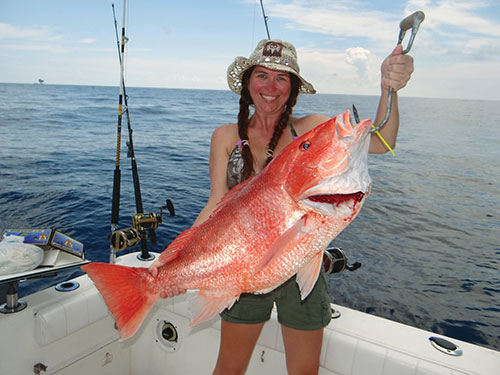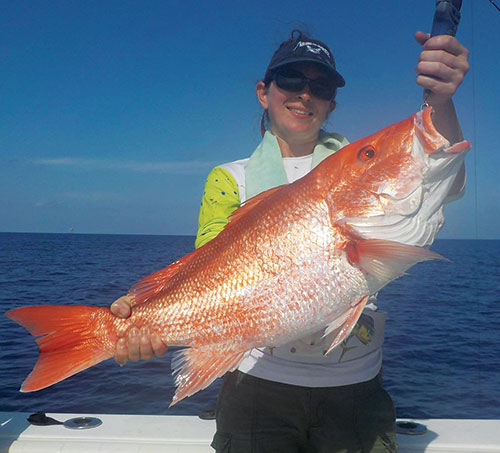
THE PROBLEM: Our Federal fisheries management has been corrupted by a well-funded, well-organized coalition of pseudo-environmental corporations, fronted by their financial beneficiaries (the Charter Fishermen’s Association, The Gulf of Mexico Reef Fish Shareholders Alliance, the Gulf Seafood Institute, the Gulf Fishermen’s Association, et al) aided by our own National Marine Fisheries Service. They share a long-term plan to convert our Public Trust Resources into private commodities, generating profits from the public’s resources for a handful of individuals via “Catch Shares”.
This began in 2006 with the reauthorization of the Magnuson-Stevens Act when “Catch Shares” (also known as IFQ’s – Individual Fishing Quotas) were introduced into the Gulf of Mexico’s red snapper fishery.
EFFECTS ON COMMERCIAL FISHING: The legal tender for the commercial IFQ holders is fish – sold to fish markets or by leasing the catch rights by the pound to other commercial fishermen without rights.

Commercial fishermen do not pay Resource Rent for profiting from their harvest of these Public Trust resources – unlike timber or mining on public lands, oil leases etc. Commercial fishermen strategically manipulated the program so that THEY receive the nation’s Resource Rent by leasing their Catch Shares to other commercial fishermen. They pocket 100% of the money into their private bank accounts and the public gets nothing.
Commercial fishermen only pay a 3% “Cost Recovery Fee” that goes toward the administration of the IFQ Catch Shares program – that’s it! The dockside wholesale price of red snapper is $4.75 per pound; the 3% CRF equals 14 cents per pound; yet they lease their Catch Shares for $3.25 per pound. The program nets 14 cents for administration and the IFQ shareholder pockets $3.11, none of which goes to enforcement, building fisheries habitat or activities to grow the fishery. It simply rapes the Public’s Resource for personal gain while giving nothing back.
The commercial IFQ shareholders are collecting our public’s Resource Rent while neither the nation nor the fisheries receive a dime. This IFQ system in the commercial sector has drained tens of millions of dollars from our fisheries and pushed it into personal bank accounts. This is not the best thing for our nation. A windfall for the few; a disaster for the majority. That’s just not right!
Catch Shares must be abolished. As with other free markets, commercial fishermen should bid on the fish they desire to harvest from the Public’s Resource each year and be prohibited from leasing between fishermen. NOBODY should have the right to collect and POCKET our nation’s Resource Rent.
THE SOLUTION FOR COMMERCIAL FISHERMEN: Leasing directly from our government would allow an affordable way for new entrants to join the commercial fishery. Instead of leasing rights at $3.25 per pound from the Sea Lords, why not lease directly from the government for $1.00 per pound? A small entrepreneur would have a much better chance of being successful, consumers would experience lower prices, and the nation and its fisheries would get the benefit from the funds.
EFFECTS ON RECREATIONAL FISHING: The legal tender for recreational fishermen is fishing days and daily bag limits. In 2006, the Gulf’s recreational red snapper fishermen had a 194 day fishing season and a four fish per day limit. In 2017, that access is 3 days with a two fish daily limit. Meanwhile the commercial poundage allocation was increased by 30%!
The recreational season was squeezed by 98% with a 50% cut in their daily limit while commercial season was increased by 300% (120 to 365 days) with 30% poundage increase. This was no coincidence.
The National Marine Fisheries Service has coordinated with commercial fishing interests since 2006 to restrict recreational access. The ultimate plan is for recreational fishermen to become willing to accept their “solution” – Recreational Catch Shares. This would be managed with IFQ’s (“Catch Shares”) for the charter businesses and fish tags for recreational fishermen. This would effectively restrict recreational access versus traditional seasons and bag limits. Estimates are that a recreational fisherman would be granted 0 to 1 tag per year!
Not to worry though! The proposal allows for Charter Boat IFQ shareholders to lease “their” catch rights to recreational fishermen– yes, just the same way as the 50 Sea Lords sublet their catch rights to small commercial fishermen….and then sit at home and no longer even have boats in the water to make their millions.
Catch Shares has no place in the recreational side of the equation. Seasons and bag limits have proven to work well for decades.
THE SOLUTION: U.S. House of Representatives Bill #HR 2023 addresses the issues involved. It’s time to correct the imbalance in our fisheries management, fire NMFS, and transfer our fisheries management to the States’ fisheries commissions.
See the bill and an executive summary of it on our Facebook page “WhatHappenedToOurFish?” While there, join the conversation. You can also email us at RecreationalFishermen@gmail.com.
